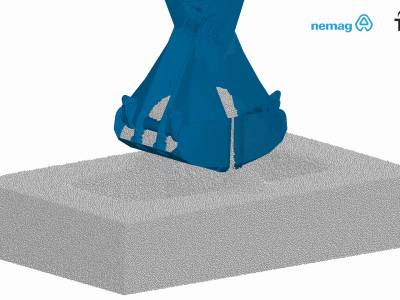- RESEARCHER
- M. Javad Mohajeri
- INSTITUTE
- TU Delft, Netherlands
- DEPARTMENT
- Maritime and Transport Technology
- SUPERVISOR
- Dr. Dingena L. Schott, Prof. Dr. ir. Cees van Rhee
- TIMELINE
- 2016-2020
Grabs are often used to unload dry bulk carriers, which offer a time- and cost-efficient service at destination ports. Grab manufacturers need to design for different crane sizes and various types of bulk materials. Therefore, they are interested in enabling affordable methods to evaluate new designs. We use our in-house coupling server to enable co-simulation between a multi-body dynamic solver (ADAMS) and a DEM solver (EDEM) to enable the possibility of analyzing and optimizing the grabbing process. The co-simulation is validated at the industrial scale by measuring a wide range of performance indicators of the grabbing process in the ship hold. Bulk density, volume, and mass of collected material by the grab are some examples of parameters that are determined in the validation experiments. The validated co-simulation accurately replicates the grabbing process, including grab's dynamics and kinematics as well as bulk material properties. In this co-simulation, around 70 to 80 m3 of bulk material is required. This would lead to an extreme computation time if the actual size of iron ore particles is used. Hence, by applying a hybrid particle-geometric scaling approach, the calibrated DEM parameters are upscaled. Additionally, the GPU solver of EDEM helps to reduce the computation time significantly, from 20 to 4 hours. Also, using the "material bed" option, particles can be generated in a separate simulation, which improves accuracy and speed of the co-simulation setup process.
Video

Figure 1
We appreciate the good communication with the developers and support team at EDEM. EDEM is a user-friendly and advanced software package contributing to the further growth of bulk solids handling technology.